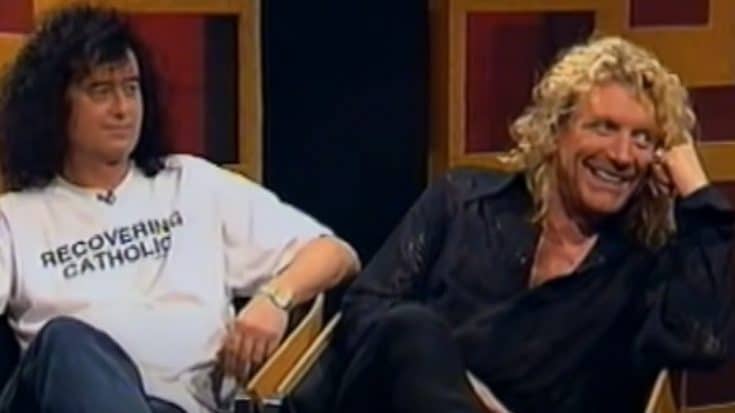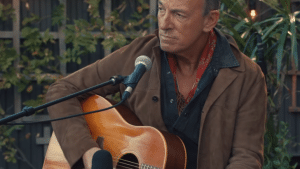How Jimmy Page Made Robert Plant Cry

via Mark Zep / Youtube
The echoes of Led Zeppelin still reverberated through the music scene long after the band’s dissolution in 1980. For vocalist Robert Plant and guitarist Jimmy Page, their creative partnership had not only redefined rock but also forged a deep personal bond.
So, when Plant witnessed Page perform without him for the first time in 1985, it was an emotional experience that transcended mere nostalgia. This was not just a reunion of past glories; it was a poignant encounter with the legacy they had built together, and the paths they had diverged upon.
As Plant later revealed in an interview with International Musician & Recording World, tears welled up in his eyes as he watched Page take the stage with his then-new band, The Firm. It was a complex mixture of emotions: pride in his former bandmate’s continued brilliance, a pang of longing for their shared past, and perhaps even a touch of bittersweet acceptance as they embarked on separate artistic journeys.
This moment, captured in a single anecdote, offered a glimpse into the profound connection between these two musical titans, and the enduring impact of their collaboration.
“I must tell you that I was weeping”
On a May evening in 1985, Jimmy Page’s post-Led Zeppelin project took the stage at Birmingham’s NEC Arena. The crowd buzzed with anticipation, not least among them Robert, who had come with his daughter Carmen to witness his former bandmate in a new musical landscape.
Plant wasn’t just a spectator; he was deeply moved. As Page, alongside Paul Rodgers from Bad Company, Tony Franklin, and Chris Slade from Uriah Heep, explored fresh sonic territories, Plant found himself overcome with emotion. “I was weeping,” he later confessed, “because I saw Jimmy stretching himself as a guitarist.”
What triggered these tears? It wasn’t just the technical prowess, but the way Page seamlessly melded his trademark innovations with the band’s rock framework. “Some of it was off the wall,” Plant admitted, “and I was stunned.” He’d never imagined hearing Page play “that well”, a testament to the guitarist’s boundless creativity even beyond the legendary Led Zeppelin days.
This emotional response wasn’t just a personal moment; it spoke volumes about the unique bond between Plant and Page. Their shared journey, though now diverging, had fostered a deep respect for each other’s artistic fire.
Robert Plant was a “vocal gymnast”
In a 1986 interview with Guitar World, Page mused on the distinct experience of collaborating with two powerhouse vocalists: Robert Plant and Paul Rodgers. After years of telepathic musical understanding with Plant in Led Zeppelin, the dynamic had shifted.
“With Paul,” Page noted, “his phrasing is totally different. I’ve never heard him sing a wrong note; he’s such a technical singer.” On the other hand, he likened Plant to a “vocal gymnast”, highlighting the singer’s freewheeling and emotive style.
This difference in vocal approach wasn’t just an observation, it influenced The Firm’s musical direction. The band consciously avoided playing Led Zeppelin or Bad Company hits, their previous ventures with Plant and Rodgers, respectively.
Choosing a clean slate, they focused on crafting entirely new material. This decision wasn’t just a practical one, it reflected Page’s desire to explore uncharted territory, both musically and in his collaborations. He embraced the fresh energy and distinct vocal landscape that Rodgers brought to the table, leaving the ghosts of past projects behind.
A short-lived refuge from past band breakups
In the ashes of their iconic bands, Jimmy Page and Paul Rodgers found solace in the formation of The Firm. Both reeling from the disbandment of Led Zeppelin and Bad Company, respectively, they sought creative refuge in a collaboration that transcended their past glories. Their two albums, The Firm and Mean Business, marked a departure from their hard rock roots, delving into a more introspective and funk-infused soundscape.
However, The Firm was never intended to be a permanent fixture. In interviews following the band’s split, both Page and Rodgers acknowledged this, stating that their journey together was always envisioned as a two-album exploration. With the conclusion of this creative chapter, each member embarked on their own path.
Page and Rodgers returned to their solo pursuits, while drummer Chris Slade found a new rhythm in AC/DC, and bassist Tony Franklin joined forces with guitar wizard John Sykes and drummer Carmine Appice in the band Blue Murder.
Although short-lived, The Firm’s legacy lives on as a testament to the creative resilience and artistic evolution of its members. It served as a bridge between their legendary past and their individual futures, showcasing their ability to adapt and push musical boundaries even after achieving immense success.













